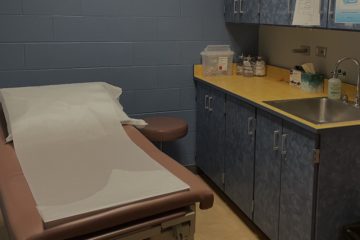By Erin Beck, Kids’ Health Correspondent
Child therapists in West Virginia tell me that the same social and political problems contributing to anxiety and other mental health problems for adults are also harming children’s moods and mental health.
“There’s so much controversy over the vaccine, and whether to be vaccinated,” said Lisa Zappia, CEO of Prestera Center. “That’s been a real anxiety-provoking experience for them, because the teenage group, they have their own beliefs about the vaccine, but their parents may believe a whole different way.”
Zappia, a licensed therapist, told me kids were already dealing with loss and anxiety after family members died or fell ill from COVID-19, and stress over frequent changes to their routine during the ongoing pandemic. And the physical and emotional changes of adolescent development are already hard, she said.
“And then couple that with all of the stress that comes from the adults over whether or not they have had to wear a mask, stress over whether or not they can take a vaccine even if they want to, and whether or not they’re allowed to take that vaccine,” she said. (The FDA studied research on thousands of children before authorizing it on an emergency basis.)
Zappia also noted that younger people in general are more open when it comes to social issues, such as LGBTQ rights.
I asked Dr. Eric Limegrover, chief clinical officer for Westbrook Health Services, whether he, too, was seeing child patients struggling with political disagreements in their households.
“I think it’s everything,” he said. “I think it’s political. I think it’s the racial issues, financial stressors and strain. I think the lack of maybe hope, the lack of resolution to any of these issues. Even the election, for some people, wasn’t the end of their anxiety. It just constituted another stage in the marathon, so to speak.”
Children need a “stabilizing force” in their lives, according to Limegrover. Structure, routine, and strong healthy, long-lasting relationships with people who care about them help.
“That level of assurance that everything’s gonna be alright, or you’re doing well, that kind of component hasn’t been part of their existence, especially for the last two years,” he said.
Last week, the U.S. Surgeon General, Admiral Vivek Murthy, issued an advisory, calling the status of youth mental health a crisis made worse by the pandemic.
His report referenced the effect of “legitimate and distressing issues,” including “the national reckoning over the deaths of Black Americans at the hands of police officers, including the murder of George Floyd; COVID-related violence against Asian Americans; gun violence; an increasingly polarized political dialogue; growing concerns about climate change; and emotionally-charged misinformation.”
As children have spent more time online, while schools are closed or kids are in quarantine, they often encounter hostility and misinformation, just as adults do. They’re also confronted with the same bad news about global and social problems. According to the report, researchers found that during the pandemic, the time teenagers spent in front of screens for activities not related to school has more than doubled, from 3.8 to 7.7 hours per day.
“And while technology platforms have improved our lives in important ways, increasing our ability to build new communities, deliver resources, and access information, we know that, for many people, they can also have adverse effects,” the report stated. “When not deployed responsibly and safely, these tools can pit us against each other, reinforce negative behaviors like bullying and exclusion, and undermine the safe and supportive environments young people need and deserve.”
How to Help
The surgeon general made a number of recommendations, including suggestions for kids and for parents and guardians.
The report says kids should: find people who support them and have open and honest conversations about their feelings, get involved in group activities, and find ways to serve and build a sense of purpose.
“Try to recognize situations that may be emotionally challenging for you, and come up with strategies to manage those emotions,” the report states. “For example, if you find it stressful to look at COVID-related news, try to check the news less often, take a break for a day or a week at a time, keep notifications off throughout the day, and avoid looking at negative stories before bed.
The surgeon general also recommended adults be attentive to how children and youth spend time online. The report suggests parents and guardians consider if their kids are on the Internet because they want to be, or because they feel like they have to be, how to create space for open conversations with my child about their experiences online, and how to be better role models.
Connect- but safely
Limegrover said those online messages can be even harder on kids.
“They don’t have the abstract thought developed well enough to really understand how to critically look at information and a lot of things that are communicated on social media platforms lack complete and total truth,” he said.
But he does have hope. Historically, many have shied away from talking about mental health problems. But mental health conditions are treatable. And we’re all experiencing the same messages that can contribute to fear, anger and confusion. We’re all being confronted with the same information that leaves us with questions about the future.
Limegorver said he notices stigma declining as more people experience mental health struggles. He pointed out that means people now have greater ability to relate to one another. He wants to see people connect safely, as well as with authenticity.
“The biggest issue I think of the whole pandemic is the disconnect – that people have disconnected from their schools or disconnected from their communities or disconnected from their support,” he said. “And the thing that has to be reestablished is a connection – that people have to put aside some of the things that are keeping them from connecting with others, their neighbors or friends.”
More: The report also made recommendations for journalists, policymakers, community groups, healthcare providers and others. Read more.
Get help:
From HELP4WV: “When it comes to children, it’s easy to see that something is wrong, but scary and difficult to know where to look for help. We are available 24 hours a day and seven days a week to assist in finding the most appropriate and available treatment for an array of youth behavioral health needs. From parenting support to immediate crisis response, contact 1-844-HELP4WV to talk to a trained Helpline Specialist who can help you understand options and link you directly to treatment providers.”
If you’re in crisis, get immediate help: Call the National Suicide Prevention Lifeline at 1-800-273- 8255, chat with trained counselors 24/7, or get help in other ways through the Lifeline.
Read the previous post in this series: COVID-19 caused more chaos for struggling WV children, and keep checking the Think Kids blog for more posts about kids’ mental health in West Virginia.





0 Comments